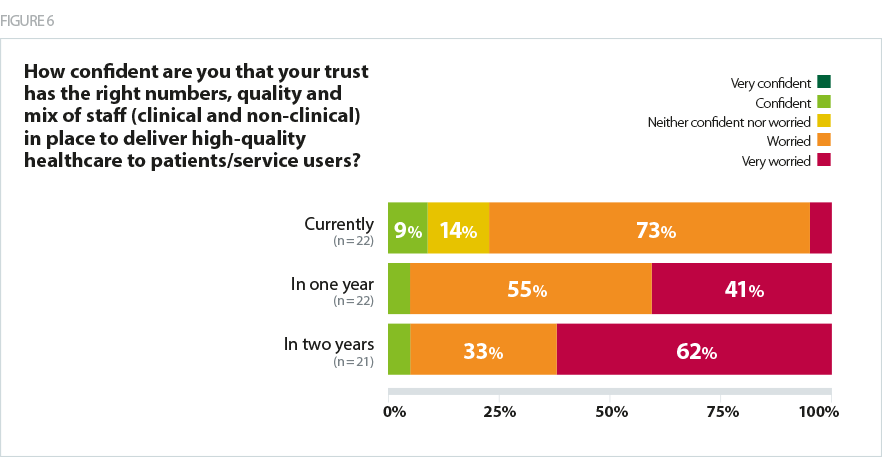Having the right workforce, with the right skills, in the right place is central to realising the long term plan’s ambition to drive further improvements in the quality of mental health care and outcomes. The NHS is facing significant workforce gaps in nearly every area, and the challenge for mental health trusts is particularly severe. The vacancy levels in mental health trusts are higher than in other sectors, especially in London where the average mental health nurse vacancy rate is 17.1%.
Despite a national pledge to expand the workforce, as set out in Health Education England’s Stepping forward to 2020/21: the mental health workforce plan, ambitions around workforce for the sector look increasingly unlikely to be met within the next two years. The total mental health nursing workforce has declined by 10% since May 2010; a reduction of over 4,000 mental health nurses. It is, however, important to note that the reduction has been in inpatient settings and encouragingly the numbers of community mental health nurses has increased over the last two years (NHS Improvement, 2018).
Our survey presents a concerning, though not surprising, picture of the impact workforce shortages are having on the sector’s ability to meet demand and provide high-quality care. Workforce shortages remain a key reason why trusts are struggling to meet local demand, and the majority of mental health trust leaders are worried about their current workforce situation. This concern is even more widespread when leaders consider the workforce situation over the next two years.
Our survey presents a concerning, though not surprising, picture of the impact workforce shortages are having on the sector’s ability to meet demand and provide high-quality care.
tweet this
As Figure 6 shows, we asked trust leaders how confident they were that they had the right number, quality and mix of staff to deliver high-quality care. Only 9% felt confident they currently have the staff they need. Nearly three quarters (73%) said they are worried and 5% said they are very worried. When asked about the numbers and skills of staff in two years time, nearly two thirds (62%) of mental health trust leaders said they were very worried – a strong sign that far from improving, these pressures are getting worse.

This concern from trusts leaders is reflected in the workforce gaps across different mental health professionals. We asked trusts to tell us the gaps across a range of professions. With varying levels of responses, the vacancy rates shown in Table 1 are indicative of the recruitment crisis trusts are facing. The average vacancy rate for all mental health staff was 11.6%, which is higher than the overall NHS vacancy rate of 8.7% reported in the most recent NHS Improvement quarterly performance report. (NHS Improvement, Performance of the NHS provider sector for the quarter ended 30 September 2018)
The fact that the majority of mental health trust leaders are worried about their current workforce situation, and this concern is even more widespread when leaders consider the workforce situation over the next two years, comes as little surprise given the significant workforce gaps across the sector as well as the NHS more broadly.
Trusts are already working to meet the workforce gaps they face, by using new roles and changing skills mix, however our survey highlights trusts’ reliance on employing locum or agency staff as well as resorting to reducing admissions or closing services as a result of workforce shortages.
The introduction of clinical associate psychologists will revolutionise the mental health workforce, providing in one year a significant increase in workforce numbers to deal with the gaps in community services. Their impact across all areas of mental health will be significant. In April next year we will role out a programme to provide a clinical associate psychologist in every secondary school. This will create a true transformation of CAMHS in the county and eliminate waiting times for assessments to tier 3 and waiting times for treatment.
Mentla health trust
In response to our survey, trusts provided an extensive list of the steps they are taking locally to address workforce shortages. These included a number of initiatives to improve recruitment and retention:
Recruitment
- working with partners across STPs/ICSs
- overseas recruitment
- introduction of new roles including nursing associates and physicians associates
- media campaigns for recruitment
- working with schools and universities
Retention
- uptake of the NHS Improvement retention scheme
- retire and return schemes
- flexible working
- improving staff wellbeing and engagement
- role redesign
- bank incentives over Christmas.
A robust workforce plan with support at local level to ensure the plan gets delivered is paramount. Whilst it was disappointing that a comprehensive national workforce strategy published alongside the long term plan, there is welcome progress on an initial implementation plan as signalled in the long term plan. The specific and pressing needs of the mental health workforce must be given appropriate priority in the plan and it must focus on short-term solutions to address current shortages as well as how to increase the mental health workforce supply over the longer term.